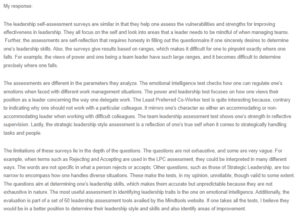Response – Leadership Self-Assessment Survey
Mathew,
I agree with you; some of the questions in the survey were hard to understand. It was challenging to determine what exactly the question sought in determining one’s skills as a leader. I particularly did not like the Strategic Leadership assessment that I took because the results were unsatisfying, to say the least. The questions were set in such a way as to imply there was only one perfect answer, and if one did not get it, then one was a poor strategist. Whichever way, I got to learn of a few areas that I could work on and others that I could start pursuing.
With regard to your question, I will be doing a qualitative study that will require participants to fill out a questionnaire with structured questions. Structured questions require a lower cognitive load from the participants. This is especially critical because the participants will be drawn from the elderly populace, and simplifying the interview process is important for its success. However, the last part of the questionnaire will have a few lines where a participant will have the chance to air any views they may have on the research topic( Rakow, 2011; Doody & Noonan, 2013).
References
Doody, O., & Noonan, M. (2013). Preparing and conducting interviews to collect data. Nurse researcher, 20(5).
Rakow, L. F. (2011). Commentary: Interviews and focus groups as critical and cultural methods. Journalism & Mass Communication Quarterly, 88(2), 416-428.
ORDER A PLAGIARISM-FREE PAPER HERE
We’ll write everything from scratch
Question 
My response:
The leadership self-assessment surveys are similar in that they help one assess the vulnerabilities and strengths for improving effectiveness in leadership. They all focus on the self and look into areas that a leader needs to be mindful of when managing teams. Further, the assessments are self-reflection that requires honesty in filling out the questionnaire if one sincerely desires to determine one’s leadership skills. Also, the surveys give results based on ranges, which makes it difficult for one to pinpoint exactly where one falls. For example, the views of power and one being a team leader have such large ranges, and it becomes difficult to determine precisely where one falls.

Response – Leadership Self-Assessment Survey
The assessments are different in the parameters they analyze. The emotional intelligence test checks how one can regulate one’s emotions when faced with different work management situations. The power and leadership test focuses on how one views their position as a leader concerning the way one delegate work. The Least Preferred Co-Worker test is quite interesting because, contrary to indicating why one should not work with a particular colleague, it mirrors one’s character as either an accommodating or non-accommodating leader when working with difficult colleagues. The team leadership assessment test shows one’s strength in reflective supervision. Lastly, the strategic leadership style assessment is a reflection of one’s true self when it comes to strategically handling tasks and people.
The limitations of these surveys lie in the depth of the questions. The questions are not exhaustive, and some are very vague. For example, when terms such as Rejecting and Accepting are used in the LPC assessment, they could be interpreted in many different ways. The words are not specific in what a person rejects or accepts. Other questions, such as those of Strategic Leadership, are too narrow to encompass how one handles diverse situations. These make the tests, in my opinion, unreliable, though valid to some extent. The questions aim at determining one’s leadership skills, which makes them accurate but unpredictable because they are not exhaustive in nature. The most useful assessment in identifying leadership traits is the one on emotional intelligence. Additionally, the evaluation is part of a set of 60 leadership assessment tools availed by the Mindtools website. If one takes all the tests, I believe they would be in a better position to determine their leadership style and skills and also identify areas of improvement.
References:
Garfinkleexecutivecoaching.com. (n.d.). Evaluate Your Influence – Personal Leadership Coaches. [online] Available at: https://garfinkleexecutivecoaching.com/evaluate-your-influence [Accessed 11 Dec. 2019].
Mindtools.com. (n.d.). How Emotionally Intelligent Are You?: Boosting Your People Skills. [online] Available at: https://www.mindtools.com/pages/article/ei-quiz.htm [Accessed 11 Dec. 2019].
Mindtools.com. (n.d.). How Good Are Your Leadership Skills?:. [online] Available at: https://www.mindtools.com/pages/article/newLDR_50.htm [Accessed 11 Dec. 2019].
Cyfar.org. (2019). Least Preferred Coworker Scale. [online] Available at: https://cyfar.org/sites/default/files/Least_PreferredCoworkerScale.pdf [Accessed 11 Dec. 2019].
Surveymonkey.com. (n.d.). Take Our Strategic Leadership Survey. [online] Available at: https://www.surveymonkey.com/r/careerwavestrategicleaders [Accessed 11 Dec. 2019].
Matthew’s response:
Hello Lisa,
Thanks for your informative post. It is true that all the leadership assessment tests focus on the self. It shows a reflection of self-attribute as leaders. One of the assessment tests that I took used terms like ambassador, advocate, people mover, truth seeker, creative builder, and experienced guide to explain my leadership characteristics. The terms seem to be vague and do not exactly address the leadership style that I wanted to evaluate. I do not think the research methodology used by the online assessment is valid. According to Greener and Martelli (2018), research design and methodology should be valid, reliable and repeatable by other researchers. I cannot rely on such a result for my self-assessment.
Another limitation that is common to all the leadership assessment tests I took is the design of the questions. Some of the questions are not easy to comprehend. The vocabulary and sentence structures are capable of confusing the respondents. The respondents may answer what they perceived to be the meaning of the questions, while the researcher actually means something else. Greener and Martelli (2018) are of the opinion that survey questions should be simplified because one cannot tell the ability of some respondents to comprehend complex sentences and vocabulary.
How do you intend to design the research questions for your qualitative research? are you using closed-ended or open-ended questions for your data collection?
Reference:
Greener, S., & Martelli, J. (2018). An introduction to business research methods (3rd ed.).